More than 51 million voters have already cast their ballots, according to a tracker from the University of Florida, with just a week to go until Election Day.
Over 24 million mail ballots have been returned, and nearly 27 million early votes have been cast in-person as of around 4 p.m. Eastern on Tuesday, the UF Election Lab’s data showed.
The latest totals are nearly a third of the 2020 vote count, when more than 154 million Americans turned out to cast their ballots, according to the U.S. Census, as the country grappled with the COVID-19 pandemic, which pushed many to opt for mail-in voting. At roughly 66 percent turnout, the 2020 presidential cycle marked the highest rate for any national election since 1900, according to Pew Research.
Four years later, Vice President Harris and former President Trump are locked in a razor-tight race for the White House, and separated by fractions of a percentage point in critical battlegrounds where turnout could make all the difference.
While early votes aren’t a strong predictor of the general election results, they can give insights into who is turning out in a tight race.
Democrats have a slight edge in early ballots, casting 39.5 percent of votes so far, per the UF Election Lab. Harris’s campaign has been pushing the party to vote early this cycle, given that key demographics — like young people energized by her fast-tracked bid — are seen as potentially unreliable Election Day voters.
Republicans make up 36.1 percent of the ballots cast so far, and minor party or unaffiliated voters make up a combined 24.4 percent. Trump and Republicans have been skeptical about early voting in the past, but the party has moved to be less hostile toward the process this cycle.
All but three states — New Hampshire, Oklahoma and Alabama — have reported vote numbers at this point, according to the tracker. Roughly half of states reported party registration data, and smaller subsets shared demographic details like age and gender.
Female voters hold a turnout edge of roughly 10 points over male voters so far, with 54.1 percent of ballots cast by women, according to data from Colorado, Georgia, Idaho, Michigan, North Carolina and Virginia.
Millions more women than men have registered to vote nationwide in recent cycles, and they’ve bested men in turnout numbers in every presidential election since 1964. This year, there are signs of a growing gender gap — particularly among younger voters — as women tack toward Democrats and men turn to the right. Democratic strategists are hoping female “ghost voters,” or low-propensity voters who aren’t captured by polls, help give Harris a leg up.
Broken down by age, voters aged 41 and older make up nearly 8 in 10 ballots so far, according to numbers from the same states that provided gender figures, plus Delaware, Iowa and Pennsylvania.
Harris is counting on Gen-Z and millennial voters after they helped boost Biden to victory in 2020, but she’s seen signs of potential problems among young male voters in recent polls. In the UF Election Lab numbers, voters younger than 26 make up just 7 percent of ballots cast so far.
Critical battleground states like Michigan, Pennsylvania and North Carolina have pulled in some of the biggest vote totals, with more than 1.44 million early votes in each state. Those states are part of important potential paths to victory for Harris and Trump, and are also home to races that could help decide control of Congress.
Just three states — Georgia, North Carolina and South Carolina — reported early vote details by race and Hispanic ethnicity. According to those numbers, non-Hispanic Black voters have cast 22 percent of votes so far.
With just a week to go until Election Day, Harris and Trump are neck-and-neck in national polling. DDHQ’s polling averages put Harris up by just a fraction of a percentage point, and the race is expected to come down to a handful of similarly tight battlegrounds. Two of those states, Georgia and North Carolina, have already seen record-setting early voting numbers.
The UF Election Lab tracker is maintained by professor Michael McDonald. Some states’ reported early vote data had been updated as recently as Tuesday, while others were a few days behind.

